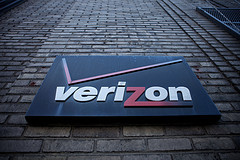Not Even Verizon Knows Exactly Why It Charges $5/Month To Keep Your Number Unpublished
Most telecom companies have pat, scripted explanations for each of their many, many monthly fees and surcharges, but when one man tried to find out why Verizon charges a $5 fee to keep his number unpublished, he got two very distinct reasons — or rather, one reason and one description of the service.
Network World’s Paul McNamara thought he would ask Verizon’s media relations people about the reasoning behind this fee and got the following explanation in reply:
“The cost charged to offer unlisted phone numbers is chiefly systems and IT based. Specifically, the costs we incur and factor into the monthly charge involve three things: quality control, data integrity and the interface we have with other carriers and directory publishers. These activities help us protect the feed of customer information we have, and must protect, when customers request that their telephone number remains private when requested.”
So it’s all for your own good — the price you pay for guaranteed privacy. That doesn’t really explain why all of this would possibly cost $60/year for each person, but it’s at least a sort of explanation.
Certainly much better than when McNamara sent off the identical question to Verizon customer service, which churned out the following robotic response:
Thank you for choosing Verizon. I have received your email dated 08/05/2012 regarding Verizon service I know how this can be important. I apologize for any frustration or inconvenience this has caused. My name is R[***], and I will be happy to assist you and also review the account to make sure you are getting the best value.
A non-published number will not be printed in telephone directories and Directory Assistance operators will not provide the number to callers requesting it.
If a caller requests a number from Directory Assistance and the number is non-published, the caller will receive the message, “The number requested is non-published.”
It is a Federal Communications Commission (FCC) mandate to notify you that if you have chosen non-listed or non-published service, your billing name and address will be shared with your chosen long distance provider for billing purposes.
However, Non-Published customers have the right to request that their billing name and address not be disclosed to other companies (other than your long distance company) for Verizon calling card, collect or bill-to-third number calls.
Thank you for using Verizon. We appreciate your business.
Great… So instead of explaining why Verizon charges the fee, the CSR just hoped that by bashing the customer into submission with an overly detailed run-down of the various facets of the service he would be discouraged from following up.
Of course, the real reason Verizon charges this $5 fee is because they can and people like me will pay. It’s that simple, although not according to Verizon.
This disparity highlight a major problem with customer service, especially customer service in the telecom/cable/satellite industry. The customer service systems at these businesses lives and dies by the FAQ sheet, assuming customers are all utter morons who will get glassy-eyed and hang up when presented with detailed non-answers. This is especially true when it comes to issues that CSRs can not help you with and which the company knows will annoy customers.
McNamara sums it up bittersweetly: “Of course, the real reason Verizon charges this $5 fee is because they can and people like me will pay. It’s that simple, although not according to Verizon.”
Thanks to Maxwell for the tip!
Want more consumer news? Visit our parent organization, Consumer Reports, for the latest on scams, recalls, and other consumer issues.


